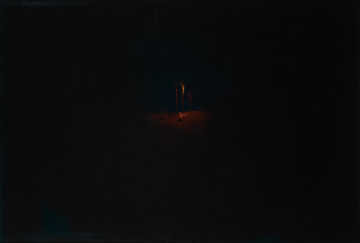
Unntitled
2009
National Museum in Szczecin
Part of the collection: Critical and post-critical art
Łajka (2011) by Agata Zbylut (born in 1974) is an artistic portrait of a dog whose tragic story, which played out in the 1950s, continues to inspire the collective imagination to this day. The historic Laika represents the numerous and mostly nameless animals, which have participated in human-led space exploration since the early 19th century. The case of Laika sent into space on 3 November 1957 aboard the Soviet satellite Sputnik 2 is special. The main and very ambitious goal of the mission – sending a living organism to Earth’s orbit – was achieved at the cost of the life of a dog, whose return to Earth was not planned from the beginning. It is assumed that Laika died after several hours of flight due to overheating and stress. In her work, Zbylut portrays Laika gazing up at the starry sky shortly before she begins her mission, which is doomed before it starts. Thanks to the means of artistic expression, used by the artist – a realistic image made of papier-mâché with fur attached to it, as well as an eye-catching animation of the night sky and shooting stars – she creates an emotional story about the world observed from an animal's perspective. In the trusting gaze of a dog, who is not aware of the impending doom, Zbylut managed to capture the essence of the relationship between humans and animals. It is a relationship based on hierarchy and domination of the former over the latter, on boundless loyalty and devotion on the one side, and instrumental treatment by the other. In Łajka, the usually overoked animal agency is put in the foreground. Other works by the artist feature other female dogs, including Misia, the artist’s pet, who actively participated in the scenes staged and photographed by the artist during her lifetime, and after her death, she was faithfully recreated by Zbylut using the same technique as in the case of Łajka, symbolically participating as an object-sculpture in many of Zbylut's later projects.
Magdalena Lewoc
Author / creator
Dimensions
cały obiekt: height: 52 cm, width: 53 cm
Object type
installation
Creation time / dating
Creation / finding place
Identification number
Location / status